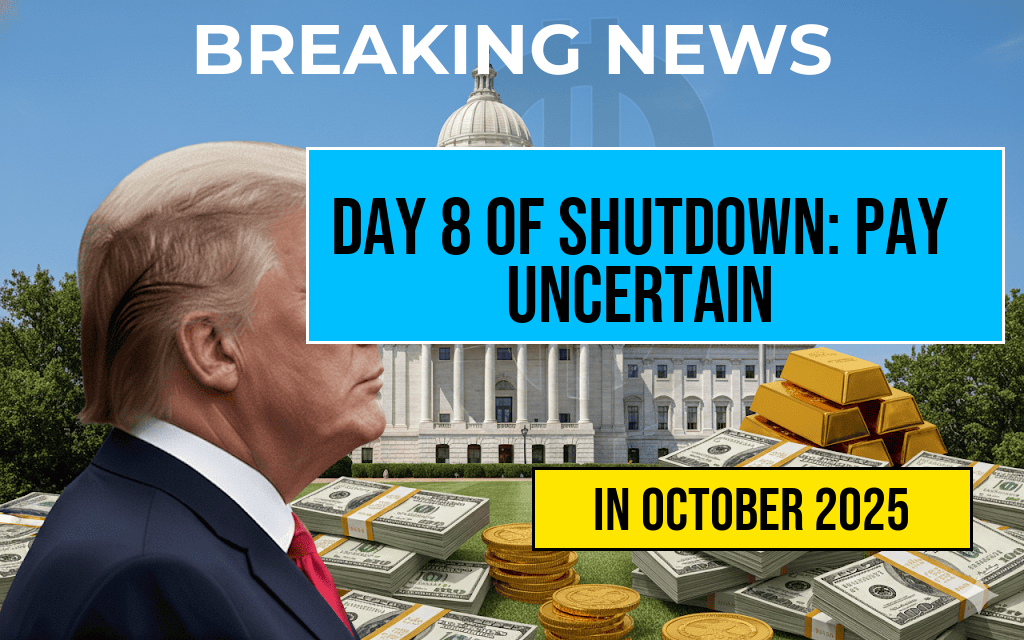As the government enters its eighth day of a partial shutdown, thousands of federal employees face mounting financial uncertainty. With no clear resolution in sight, questions swirl about whether federal workers will receive their full paychecks or endure delayed or reduced compensation. The shutdown, triggered by a political impasse over federal spending legislation, continues to stall essential government functions, affecting a broad spectrum of agencies, from national parks to national security. While some federal employees are furloughed, others are required to work without pay, raising urgent concerns about their financial stability. Lawmakers remain divided over funding priorities, and negotiations show little sign of imminent breakthrough, leaving federal employees in limbo as the shutdown persists.
Understanding the Scope of the Shutdown
The current government shutdown began on October 1, 2023, after Congress failed to pass a continuing resolution to fund federal agencies. As a result, approximately 800,000 federal employees have been impacted, with many furloughed and others working without pay. The shutdown affects numerous agencies, including the Department of Homeland Security, the Department of Agriculture, and the Department of Commerce, among others. Essential services such as national security, law enforcement, and emergency response continue to operate, but many administrative functions are halted.
Who Will Receive Pay and Who Won’t?
Federal employees fall into two primary categories during a shutdown: those who are furloughed and those required to work. Furloughed employees are temporarily sent home without pay, while essential personnel, such as TSA agents and military members, often continue working but face uncertainty about when they will receive their paychecks. Historically, payments to federal workers have been delayed during shutdowns, with some receiving back pay once the government reopens. However, the timing and certainty of these payments are not guaranteed, creating significant financial stress for workers.
Legal and Policy Framework
The Antideficiency Act restricts federal agencies from incurring obligations or making payments that exceed appropriations, which is the legal basis for withholding pay during a shutdown. Nonetheless, the Office of Management and Budget (OMB) has clarified that employees required to work during a shutdown are generally entitled to pay once appropriations are restored, provided their work is deemed essential. Yet, delays in processing payments are common, and some employees might experience extended periods without income, especially if the shutdown persists beyond a few weeks.
Financial Impacts on Federal Employees
| Employee Category | Number Affected | Pay Status | Potential Financial Impact |
|---|---|---|---|
| Furloughed Employees | Approximately 400,000 | No pay during shutdown | Immediate loss of income, potential hardship for bills and essentials |
| Essential Workers | Approximately 400,000 | Work required; pay delayed or uncertain | Work without pay until resolution, increased financial stress |
| Military Personnel | Over 1 million | Mandatory work; pay delayed | Operational duties continue; delayed compensation |
Many federal employees rely on their paychecks for basic expenses, and the ongoing shutdown exacerbates financial insecurity. Some workers have reported difficulties in meeting mortgage payments, rent, and other essential bills, raising concerns about broader economic ripple effects. The American Federation of Government Employees (AFGE) has called for swift resolution, emphasizing the hardship faced by workers and their families.
Political Standoff and Negotiation Dynamics
The core dispute fueling the shutdown relates to disagreements over budget allocations, border security funding, and immigration policies. House and Senate leaders remain entrenched in negotiations, with each side blaming the other for the impasse. Despite bipartisan efforts, no comprehensive agreement has emerged, and the Senate has repeatedly failed to pass a temporary funding measure. The lack of progress has kept federal agencies in limbo, intensifying pressure on lawmakers to broker a deal that can reopen the government and ensure pay for federal employees.
Potential Paths Forward
- Continuing Resolution: Passing a short-term funding bill to reopen agencies while negotiations continue.
- Full Budget Agreement: Reaching a comprehensive deal that addresses funding levels and policy priorities.
- Legal Interventions: Some suggest that courts could intervene to ensure pay for essential personnel, but such options remain complex and uncertain.
What Federal Employees Can Do
Employees affected by the shutdown are advised to monitor official communications from their agencies and the Office of Personnel Management. Financial planning experts recommend assessing emergency funds, exploring short-term credit options, and reaching out to local assistance programs if necessary. Lawmakers have indicated that legislation to compensate federal workers for lost wages during shutdowns may be considered once a deal is reached, but immediate relief remains uncertain.
Public and Economic Repercussions
The shutdown’s ripple effects extend beyond federal employees. Small businesses that rely on government contracts, tourism at national parks, and various sectors dependent on federal services are experiencing disruptions. Economists warn that prolonged shutdowns can undermine economic confidence and growth, emphasizing the importance of a swift political resolution.
Sources and Further Reading
- Wikipedia: Government shutdown in the United States
- Forbes: What The Government Shutdown Means For Federal Workers
- Office of Management and Budget
Frequently Asked Questions
Will federal employees receive their full pay during the 8th day of the government shutdown?
As of Day 8 of the government shutdown, many federal employees are uncertain about their pay. Typically, during a shutdown, non-essential employees may face delays or deductions, but essential personnel might continue to receive full pay depending on congressional decisions and funding status.
How long can federal employees go without receiving pay during a government shutdown?
The duration an employee can go without pay depends on the funding availability and congressional resolutions. Some employees may experience pay delays starting from the 8th day, with ongoing financial uncertainty if the shutdown persists.
Are there any options for federal employees to receive financial assistance during the shutdown?
Federal employees facing financial hardship during the shutdown can explore emergency loan programs or assistance initiatives offered by some agencies or external organizations. However, funding availability varies, and employees are encouraged to contact their HR departments for guidance.
Will the government provide back pay to federal employees once the shutdown ends?
Typically, back pay is granted to federal employees for the period of the shutdown once funding is restored and the government reopens. However, this process depends on legislative approval and may involve delays.
What are the potential impacts of the government shutdown on federal services and employees?
The shutdown can lead to furloughs, decreased public services, and uncertainty for federal employees. Essential personnel may work without pay temporarily, while non-essential staff face work stoppages, affecting overall government operations.






